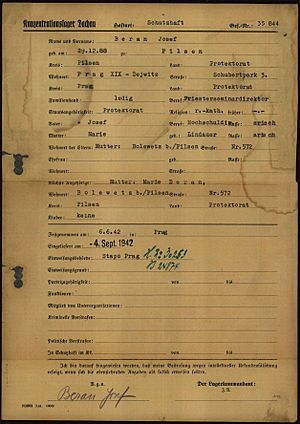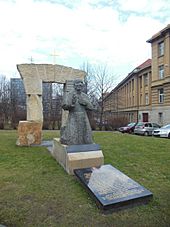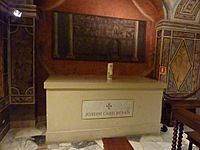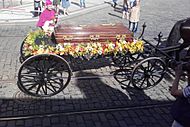Josef Beran facts for kids
Quick facts for kids His Eminence Josef Beran Servant of God |
|
|---|---|
| Cardinal Archbishop of Prague |
|
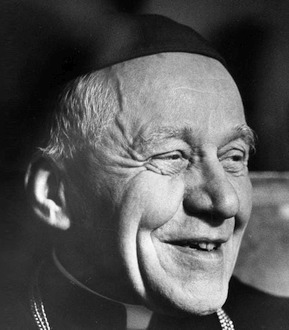 |
|
| Church | Roman Catholic Church |
| Archdiocese | Prague |
| See | Prague |
| Appointed | 4 November 1946 |
| Reign ended | 17 May 1969 |
| Predecessor | Karel Kašpar |
| Successor | František Tomášek |
| Other posts | Cardinal-Priest of Santa Croce in Via Flaminia (1965-69) |
| Orders | |
| Ordination | 10 June 1911 |
| Consecration | 8 December 1946 by Saverio Ritter |
| Created Cardinal | 22 February 1965 |
| Rank | Cardinal-Priest |
| Personal details | |
| Birth name | Josef Beran |
| Born | 29 December 1888 Plzeň, Plzeňský kraj, Bohemia, Kingdom of Bohemia |
| Died | 17 May 1969 (aged 80) Pontifical Nepomucene College, Rome, Italy |
| Buried | Saint Peter's Basilica, Vatican City (until 2018) Saint Vitus Cathedral (from 2018) |
| Alma mater | Pontifical Urbaniana University |
| Motto | Eucharistia et labor ("Eucharist and labor") |
| Coat of arms |  |
| Sainthood | |
| Attributes | Cardinal's attire |
| Styles of Josef Beran |
|
|---|---|
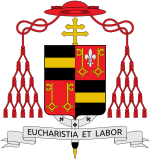 |
|
| Reference style | His Eminence |
| Spoken style | Your Eminence |
| Informal style | Cardinal |
| See | Prague |
Josef Beran (born December 29, 1888 – died May 17, 1969) was a Czech Catholic leader. He served as the Archbishop of Prague from 1946 until his death. In 1965, he became a Cardinal, which is a very high rank in the Catholic Church.
Josef Beran was held in the Dachau concentration camp during World War II. The Nazis imprisoned him because they saw his actions as a challenge to their power. He became very ill in 1943 but survived. After the Allied forces freed the camp in 1945, Pope Pius XII chose him to lead the Church in Prague.
However, when the communist government took over in 1948, Beran was again imprisoned. He was later placed under house arrest. He was finally released in 1963, but he was not allowed to act as an archbishop. In 1965, he was sent away to Rome as part of an agreement between the Church and the government.
In 1998, a process began to recognize him as a saint, and he was given the title Servant of God. He was buried in Saint Peter's Basilica in Rome, a rare honor for someone not from Italy. In 2018, his remains were moved back to his home country and buried in St. Vitus Cathedral in Prague.
Contents
Life Story of Josef Beran
Early Life and Priesthood
Josef Beran was born in Plzeň on December 29, 1888. He was the oldest of four children. His father was a schoolteacher, and his mother was Marie Lindauerová. Josef thought about studying medicine, but a teacher suggested he become a priest instead.
He began his studies in Plzeň in 1899 and finished in 1907. Then, he went to the Pontifical Urbaniana University in Rome from 1907 to 1911. He became a priest on June 10, 1911, in Rome. In 1912, he earned a special degree called a doctorate.
Beran worked in parishes in Plzeň until 1932. He also served as a chaplain and director for a religious institute. From 1932 to 1942, he guided students training to be priests in Prague. He also taught as a professor at Charles College. In 1936, Pope Pius XI gave him the title of monsignor.
Beran made sure that Pope Pius XI's important document, Mit brennender Sorge, was shared in Prague. This document spoke out against racism. In 1939, he became a full professor. The Nazis saw him as a problem because he stood up for his beliefs.
In June 1942, during World War II, Beran announced he would hold a special church service for Czechoslovak prisoners of war. He planned to do this in Czech, which went against Nazi rules. The Gestapo, the Nazi secret police, arrested him on June 6, 1942. They called him "subversive and dangerous."
He was imprisoned without a trial in places like Pankrác and Theresienstadt. He was also sent to the Dachau concentration camp. In 1943, he nearly died from a serious illness there. He stayed at Dachau until April 29, 1945, when Allied forces freed the camp. When he returned to Prague, the President of Czechoslovakia gave him the highest national honors.
Becoming Archbishop
On November 4, 1946, Josef Beran was chosen to be the Archbishop of Prague. This made him the leader of the Catholic Church in Czechoslovakia. He officially became a bishop on December 8, 1946.
In 1948, Klement Gottwald became the communist president of Czechoslovakia. Beran initially held a special church service for the new president. However, as the communist government grew stronger, Beran spoke out. He told his priests not to promise loyalty to the new government. He believed this would go against their Christian faith.
He also protested when the government took land from the Prague archdiocese. He demanded that the Catholic Church have "absolute freedom" as guaranteed by law. He spoke against the government's attempts to control the Church. On June 19, 1949, he was put under house arrest. He said he was "deprived of all personal freedom."
He was moved from Prague on March 10, 1951, and held in various places. He was forbidden from performing his duties as archbishop. He refused to resign from his position, even under pressure. In 1961, Pope John XXIII sent him a letter for his 50th anniversary as a priest. But the letter was returned, so the Pope published it in a newspaper.
Cardinal and Exile
After his release in 1963, Beran was still not allowed to act as archbishop. He offered to resign many times, but the Pope refused. In 1965, he agreed to move to Rome. This was part of a deal between the Church and the Czech government. This agreement allowed new bishops to be appointed in Czechoslovakia.
Beran knew that moving to Rome meant he was being sent away from his home. He did not want to leave at first. But he decided to go for the good of the Czech Church. On February 22, 1965, Pope Paul VI made him a Cardinal. He was given the title of Cardinal-Priest of Santa Croce in Via Flaminia.
As a Cardinal, he took part in the last meeting of the Second Vatican Council in 1965. During a discussion about religious freedom, he spoke powerfully. He suggested that the Church's past struggles were a result of attacks on religious freedom. He received a standing ovation for his speech. In 1966, he visited the United States of America and received several awards.
Death and Burial
Cardinal Beran died from lung cancer in Rome in 1969. He was living at the Pontifical Nepomucene College. Pope Paul VI rushed to visit him but arrived just minutes after he passed away.
He was buried in the grotto (a cave-like area) of Saint Peter's Basilica in Rome. Pope Paul VI led his funeral service. After his death, another Cardinal called Beran "the second Saint Adalbert," a famous Czech saint.
Return to Prague
Josef Beran had wished to be buried in Prague. However, the communist government in Czechoslovakia did not allow his remains to be brought back after his death. This changed in 2018. Pope Francis allowed his remains to be moved to Prague. This happened on April 20, 2018.
A special plaque was placed at his old tomb in Rome. His coffin was taken to the Saint Vitus Cathedral in Prague. He was finally buried there on April 23, 2018, in the Saint Agnes of Bohemia chapel. This move happened after his family and another Cardinal requested it from the Pope.
Memorial in Prague
A memorial stone for Josef Beran was blessed on May 13, 2009, in Prague. Cardinal Miloslav Vlk said that "truth" and "fairness" were very important to Beran's life. Many church leaders were present at the event.
Becoming a Saint
The process to declare Josef Beran a saint began on February 9, 1998. The Church officially gave him the title Servant of God. This means the first step in the process has been completed.
On April 2, 1998, the process officially started in Prague. This involved collecting documents and stories from people who knew him. This helps to show his reputation for holiness. Cardinal Miloslav Vlk led the start of this process. The collection of information was completed on May 17, 2018.
See also
 In Spanish: Josef Beran para niños
In Spanish: Josef Beran para niños
 | Anna J. Cooper |
 | Mary McLeod Bethune |
 | Lillie Mae Bradford |


